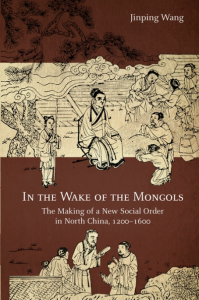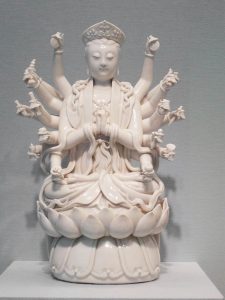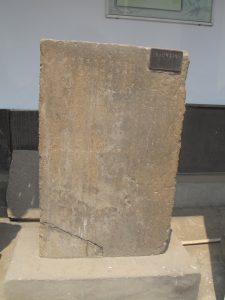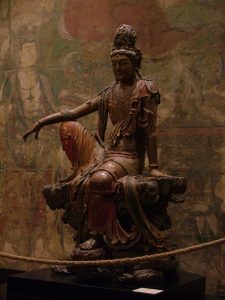Featuring A Success Story (FASS) – Tier 1 Grants
February 28, 2022
The Ministry of Education Tier 1 Grants, administered by the NUS Faculty of Arts and Social Sciences, have 2 to 3 calls every financial year. The application is open to all tenure track faculty members and the grant supports projects in the social sciences and humanities with a total project value of below S$180,000 over three years. The next grant call closes on 4 March 2022. Learn more about the grant at FASS Research Intranet.
 Associate Professor Jinping Wang’s Tier 1 grant, “A Cultural History of Quanzhen Daoism in Thirteenth-Century North China”, explores the ways in which Quanzhen Daoism, one of the two major Daoist schools in China, challenged traditional Chinese norms of gender, family system, and imperial cults when this religion developed into a powerful nationwide monastic order in thirteenth-century north China. The aim of the project was to produce three journal articles as spin-off projects deriving from the research for her first book, In the Wake of the Mongols: The Making of a New Social Order in North China, 1200-1600 (Harvard Asia Center, 2018), while expanding her study on Middle-Period north China from primarily a social-historical approach to a cultural-historical approach.
Associate Professor Jinping Wang’s Tier 1 grant, “A Cultural History of Quanzhen Daoism in Thirteenth-Century North China”, explores the ways in which Quanzhen Daoism, one of the two major Daoist schools in China, challenged traditional Chinese norms of gender, family system, and imperial cults when this religion developed into a powerful nationwide monastic order in thirteenth-century north China. The aim of the project was to produce three journal articles as spin-off projects deriving from the research for her first book, In the Wake of the Mongols: The Making of a New Social Order in North China, 1200-1600 (Harvard Asia Center, 2018), while expanding her study on Middle-Period north China from primarily a social-historical approach to a cultural-historical approach.
Why did you decide to apply for a Tier 1 grant rather than another type of grant (e.g. HSS seed fund, Tier 2 etc)?
 I applied for a Tier 1 grant in September 2016, when my Start-up grant had just ended. At the time, my book manuscript In the Wake of the Mongols: The Making of a New Social Order in North China, 1200-1600, was under review by the Harvard University Asia Center, and I was using the post-manuscript time to work on a few spin-off projects that derived from my research for the book. I wasn’t sure whether these article-length projects would lead to any larger projects that merit more ambitious grants. In addition, I needed a grant to cover mainly just three categories of expenses: 1) overseas trips for library research and fieldwork; 2) participation in three international conferences to present my work; and 3) hiring a professional editor to copyedit my articles before submitting them to targeted journals. Thus, the amount of the grant I needed to support my research was not large, and the Tier 1 Grant was clearly the best option.
I applied for a Tier 1 grant in September 2016, when my Start-up grant had just ended. At the time, my book manuscript In the Wake of the Mongols: The Making of a New Social Order in North China, 1200-1600, was under review by the Harvard University Asia Center, and I was using the post-manuscript time to work on a few spin-off projects that derived from my research for the book. I wasn’t sure whether these article-length projects would lead to any larger projects that merit more ambitious grants. In addition, I needed a grant to cover mainly just three categories of expenses: 1) overseas trips for library research and fieldwork; 2) participation in three international conferences to present my work; and 3) hiring a professional editor to copyedit my articles before submitting them to targeted journals. Thus, the amount of the grant I needed to support my research was not large, and the Tier 1 Grant was clearly the best option.
What do you think were the strengths of your grant application that led to it being funded?
 I think the success in my grant application resulted from a convincing explanation of the project’s origin and its potential contributions, as well as a reasonable plan for deliverables. I made it clear in the grant proposal that the project would yield three journal articles, which would focus, respectively, on 1) the Daoist appropriation of the imperial cult of Confucian sage-kings, 2) women in the Quanzhen Daoist order, and 3) the Quanzhen Daoist discourse on family abandonment. I also mentioned that I had already written preliminary drafts of the first two articles, which gave me a clear vision of what fieldwork and archival exploration were needed to complete the research.
I think the success in my grant application resulted from a convincing explanation of the project’s origin and its potential contributions, as well as a reasonable plan for deliverables. I made it clear in the grant proposal that the project would yield three journal articles, which would focus, respectively, on 1) the Daoist appropriation of the imperial cult of Confucian sage-kings, 2) women in the Quanzhen Daoist order, and 3) the Quanzhen Daoist discourse on family abandonment. I also mentioned that I had already written preliminary drafts of the first two articles, which gave me a clear vision of what fieldwork and archival exploration were needed to complete the research.
Did you face any challenges implementing the grant? If so, what did you do to overcome those challenges?
The main challenge for me was to readjust the deliverables. Of the three articles, only the first article went as planned; it has been published with a top-tier journal in my field of Chinese history (“Daoists, the Imperial Cult of Sage-Kings, and Mongol Rule,” T’oung Pao: International Journal of Chinese Studies 106, Issue 3-4 (2020): 309-357). For the second article on Quanzhen women, I eventually decided not to publish it as a stand-alone journal article. Instead, I incorporated about half of the article into the revised book manuscript to give the book a distinctive gender perspective when discussing how the Mongol conquest impacted society in north China differently than in the more thoroughly-studied south.
 The most difficult adjustment —but also the most rewarding in the long run—was for the third article. It took me much longer time than expected to write early drafts and none of the drafts satisfied me. Gradually, I realized that the topic—the Quanzhen discourse and practice of family abandonment—had great potential to be developed into a book-length project. A thorough exploration of the topic, however, requires not just analysis of a broad range of primary sources—including poetry, hagiographies, inscriptions, murals, paintings, and dramas—but also engagement with secondary sources in multiple fields such as religious studies, literary studies, and art history. In the end, I applied for and received the HSS Seed Fund to support my continued research to explore the possibility of extending the third article to a book-length project. With the support of both the Tier 1 and the HSS Seed grants, the thoroughly revised article has been accepted by History of Religions, a top-tier journal in the field of religious studies; it is scheduled to be published in November 2022. I was able to adjust my goal of deliverables due to the flexibility the Tier 1 grant kindly offered.
The most difficult adjustment —but also the most rewarding in the long run—was for the third article. It took me much longer time than expected to write early drafts and none of the drafts satisfied me. Gradually, I realized that the topic—the Quanzhen discourse and practice of family abandonment—had great potential to be developed into a book-length project. A thorough exploration of the topic, however, requires not just analysis of a broad range of primary sources—including poetry, hagiographies, inscriptions, murals, paintings, and dramas—but also engagement with secondary sources in multiple fields such as religious studies, literary studies, and art history. In the end, I applied for and received the HSS Seed Fund to support my continued research to explore the possibility of extending the third article to a book-length project. With the support of both the Tier 1 and the HSS Seed grants, the thoroughly revised article has been accepted by History of Religions, a top-tier journal in the field of religious studies; it is scheduled to be published in November 2022. I was able to adjust my goal of deliverables due to the flexibility the Tier 1 grant kindly offered.
What do you think the Tier 1 grant enabled you to achieve that you would not have been able to do without it?
 The Tier 1 grant enabled me to maintain productivity in the transition period between my first and second book projects. Most importantly, it allowed me to follow my research interests and instincts to explore a project for which I originally had only modest expectations but eventually realized had full potential to be developed into a book-length project. In short, the project under the support of the Tier 1 grant became a significant stepping stone for me toward a larger research project that is suitable for more ambitious grants like the Tier 2 grant and would eventually yield my second book.
The Tier 1 grant enabled me to maintain productivity in the transition period between my first and second book projects. Most importantly, it allowed me to follow my research interests and instincts to explore a project for which I originally had only modest expectations but eventually realized had full potential to be developed into a book-length project. In short, the project under the support of the Tier 1 grant became a significant stepping stone for me toward a larger research project that is suitable for more ambitious grants like the Tier 2 grant and would eventually yield my second book.
What do you think you would have done differently if you could start all over again?
I don’t think I would have done anything differently if I could start all over again. I had a great experience with the Tier 1 grant and benefited a lot from its support. I am very grateful for a variety of opportunities the Tier 1 Grant offered, and I would definitely apply for it again.
Thank you very much for sharing your experiences with T1 grants, Jinping! We wish you the best in your current and future research projects!
For more Tier 1 Success Stories, check out the following:
- Assistant Professor Alex Mitchell’s “Exploring ‘Literary’ Devices for Poetic Interactivity” and “Understanding Repeat Engagement with Dynamically Changing Computational Media”
- Assistant Professor Juwon Seo’s “Randomization Tests of Copula Symmetry” and related papers
For HSS Fellowship Success Stories, check out the following:
- Professor William Bain’s “Political Theology of International Order”
- Associate Professor Ian Chong’s “Buying Out, Cashing In: Non-Leading States, Aggregated Reactions, and the Problems of Power Transition”
Stay tuned for forthcoming features on FASS Book Grant Awardees!

